Table of Contents
Saudi Arabia has the second-largest proven oil reserves in the world and ranks as one of the largest petroleum exporting countries. The top oil and gas companies in Saudi Arabia contribute significantly to the economy by generating nearly 75% of government revenue.
The state-owned Saudi Aramco (formerly the Arabian American Oil Company) is the largest oil and gas company in Saudi Arabia. The company is not only the biggest oil and gas company but also one of the world’s largest integrated energy and chemicals companies that operates across the upstream, midstream, and downstream segments.
Some of the foreign oil and gas firms, such as Chevron Corporation, Royal Dutch Shell, Mobil (Standard Oil), TotalEnergies, and SINOPEC, have also set foot on the Kingdom’s oil and gas reserves. Aramco holds the majority of the shares in these companies by forming subsidiaries focused on refining and distribution of oil products.
In this blog, we explore the top 10 oil and gas companies in Saudi Arabia 2025 based on the latest revenue generated.
List of Top 10 Largest Oil and Gas Companies in Saudi Arabia (Based on Revenue 2024)
Company | Founded | Headquarters | Expertise Area | Latest revenue 2024 (USD Billion) |
Saudi Aramco | 1933 | Dhahran, Saudi Arabia | Oil and Gas Exploration, Production, Refining, Petrochemicals, Marketing and Distribution | 436 |
Petro Rabigh | 2005 | Rabigh, Saudi Arabia | Petrochemicals and Refining | 10.5 |
Arabian Petroleum Supply Company (APSCO) | 1,960.00 | Dammam, Saudi Arabia | Petroleum Products Transportation and Logistics | 2.69 |
Saudi Arabian Chevron Inc. (SAC) | 2000 | Mina Saud, Kuwait | Offshore and Onshore Exploration and Production, Enhanced Oil Recovery (EOR) | |
Saudi Aramco Base Oil Company – Luberef | 1976 | Jeddah, Saudi Arabia | Production and Marketing of Base Oils and Lubricants | 2.6 |
Saudi Aramco Total Refining and Petrochemical Company (SATORP) | 2008 | Jubail Industrial City, Saudi Arabia | Refining and Petrochemicals | |
Saudi Aramco Jubail Refinery Company (SASREF) | 1981 | Jubail Industrial City, Saudi Arabia | Refining | |
Saudi Aramco Mobil Refinery Company (SAMREF) | 1933 | Jizan Economic City, Saudi Arabia | Refining | 0.29 |
Yanbu Aramco Sinopec Refining Company (YASREF) | 2010 | Yanbu Industrial City, Saudi Arabia | Refining and Petrochemicals | |
Medra Arabia | 2008 | Dammam, Saudi Arabia | Oil and Gas Midstream Services |
Saudi Aramco
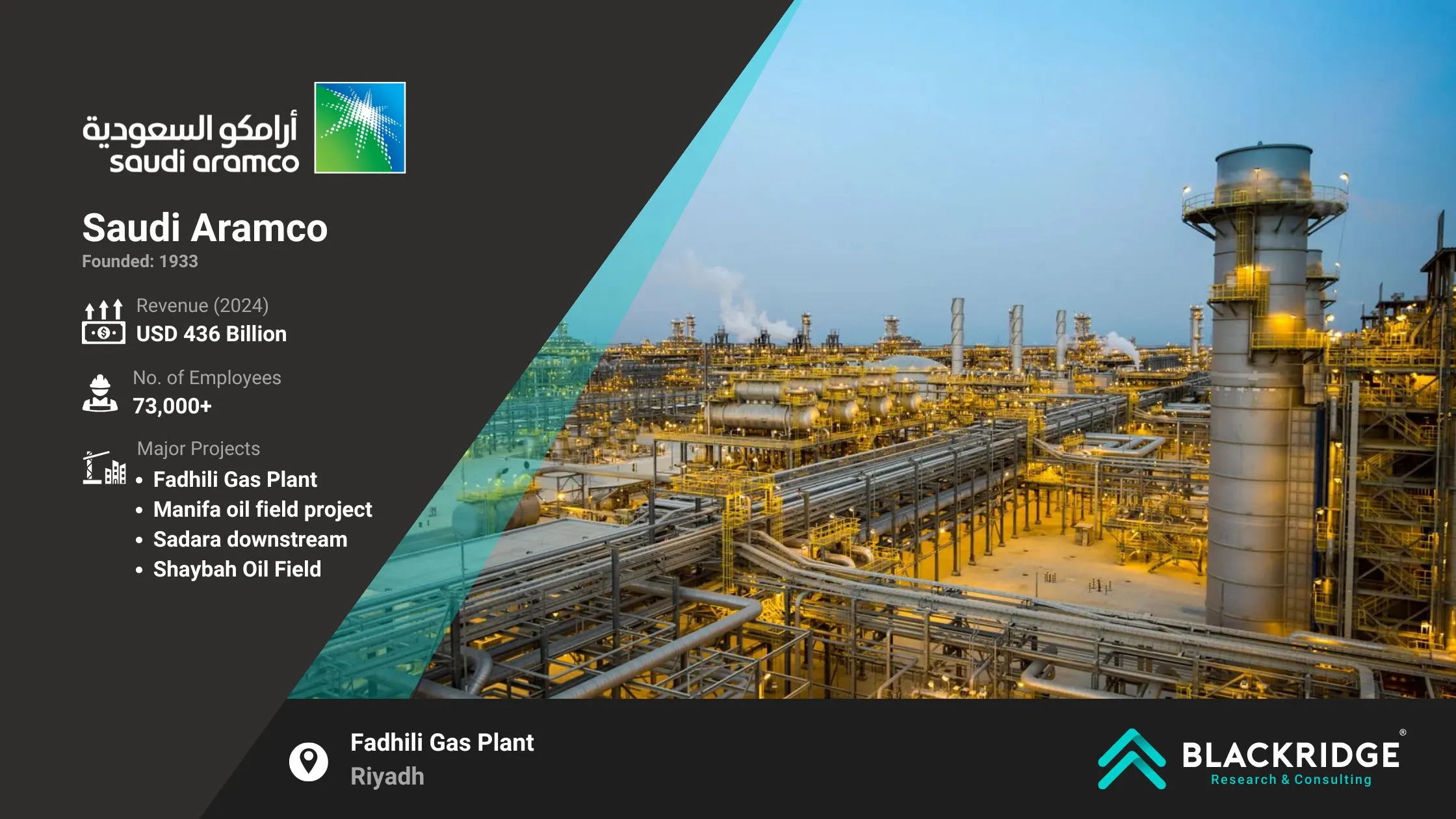
Saudi Aramco (Saudi Arabian Oil Company / Saudi Arabian oil co) is the largest oil and gas company in Saudi Arabia. The company, headquartered in Dhahran, is a majority state-owned company, making it the national oil company in Saudi Arabia. Aramco is not only the world's largest integrated oil and gas company but also the sixth-largest company in the world by market capitalization (SAR 6.24 trillion in April 2025).
Saudi Aramco produces over 11 million barrels of oil per day, which contributes the majority of oil revenue to the Saudi Arabian economy. The company operates across the three sectors in oil and gas, including upstream, midstream, and downstream. Saudi Aramco has the world's second-largest proven crude oil reserves, at more than 270 billion barrels (43 billion cubic meters).
The company operates the Master Gas System, the world’s largest single hydrocarbon network. Saudi Aramco also operates the world's largest onshore oil field - the Ghawar field and the world's largest offshore oil field, Safaniya Field.
Aramco also set up some of the world's largest oil refineries, including Jazan Refinery and terminal projects (JRTP), Jeddah Refiner, Ras Tanura Refinery, The Saudi Aramco Jubail Refinery Co. (SASREF), Jubail, Riyadh Refinery and Yanbu Refinery.
Saudi Aramco is accelerating to expand its horizon with 110 projects between 2024 and 2026. This includes 67 upcoming projects in oil, gas, and petrochemicals, 20 in pipeline construction, and 23 infrastructure projects in Saudi Arabia.
Saudi Aramco is moving forward with multiple offshore EPCI (engineering, procurement, construction, and installation) projects under its long-term agreement (LTA) framework, which supports brownfield and maintenance developments.
In October 2025, Aramco has finalized an USD 11 billion deal for the Jafurah midstream lease in Saudi Arabia, marking one of the largest energy agreements in the region.
40+ reviews
Find the Latest Oil & Gas Production Projects Around the World with Ease
Gain exclusive access to our industry-leading database of offshore wind opportunities with detailed project timelines and stakeholder information.
Collect Your Free Leads Here!
No credit cardUp-to-date coverage
Joined by 750+ industry professionals last month
Petro Rabigh
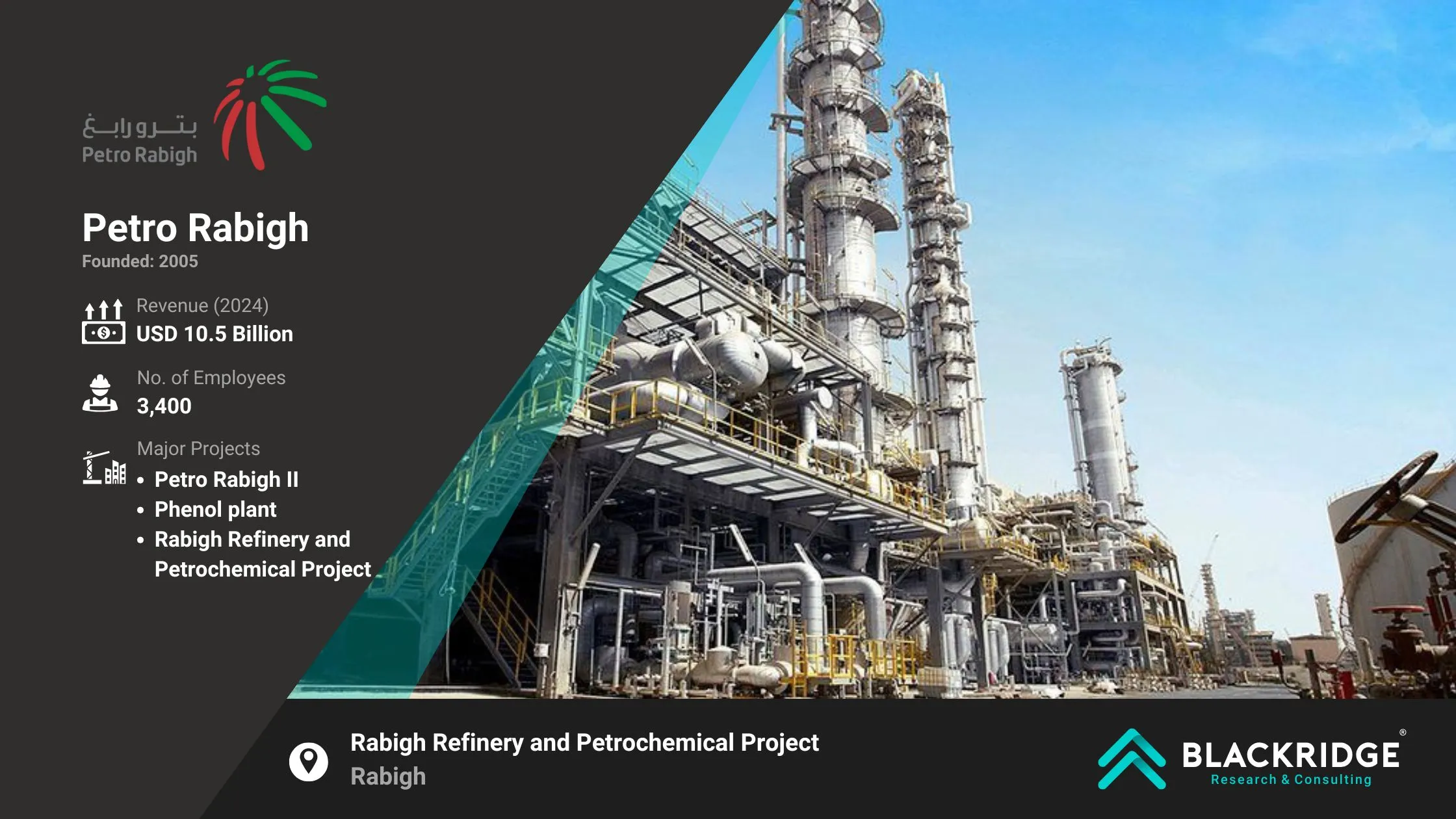
Rabigh Refining & Petrochemical Company (Petro Rabigh) is a premier Saudi-based entity specializing in the production and marketing of refined hydrocarbons and petrochemical products. Founded in 2005 as a joint venture between Saudi Aramco and Sumitomo Chemical, Petro Rabigh is a leader in producing and marketing refined hydrocarbons and petrochemicals.
Petro Rabigh was established as a joint venture between Saudi Aramco and Japan’s Sumitomo Chemical, creating one of the world’s largest integrated refining and petrochemical complexes on Saudi Arabia’s west coast. Listed on the Saudi Stock Exchange since 2008, the company offered 25% of its shares for public subscription.
In August 2024, Aramco acquired an additional 22.5% stake in Petro Rabigh from Sumitomo Chemical for USD 702 million, raising Aramco’s equity stake to 60% and making it the company’s largest shareholder, while Sumitomo Chemical retains a 15% share.
Petro Rabigh produces 2.4 million tonnes of petrochemicals annually, including essential products like ethylene and polyethylene. The complex also produces significant volumes of gasoline and other refined products.
Arabian Petroleum Supply Company (APSCO)
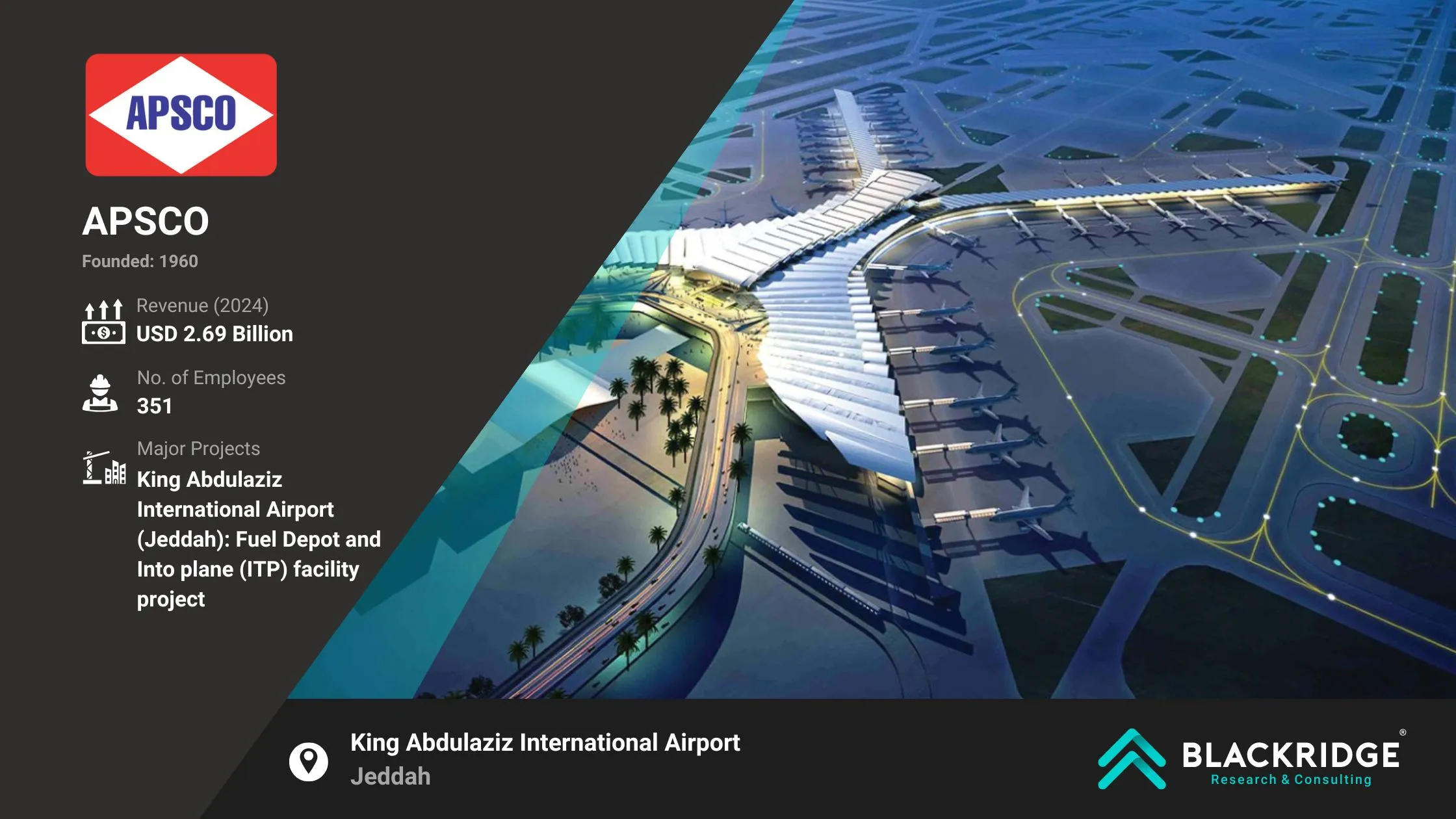
Arabian Petroleum Supply Company (APSCO) is one of the largest energy suppliers in Saudi Arabia. Established in 1960, the company produces a comprehensive range of products and services, including Mobile lubricants, petroleum products, aviation fuels, and marine bunkers.
APSCO was originally a joint venture between Mobil Corporation (now Exxon Mobil) and Haji Abdullah Alireza & Company (HAACO). Later, APSCO became fully Saudi-owned in 2007. APSCO, one of the world's leading aviation fuel suppliers, provides exclusive fuel supply at Jeddah King Abdulaziz International Airport and across 24 other airports nationwide.
Aligned with Saudi Vision 2030 and the Saudi Green Initiative, APSCO is committed to sustainable energy solutions. Through a press release in September 2024, APSCO announced that it signed a strategic agreement with Bahrain Airport Company to enhance the operational experience and excellence and elevate the overall passenger experience.
In April 2025, Red Sea Global and daa International partnered with APSCO to introduce Sustainable Aviation Fuel (SAF) at The Red Sea International Airport. The move supports greener aviation by reducing lifecycle emissions. SAF is produced from clean hydrogen, captured CO₂, or renewable waste-derived sources.
Saudi Arabian Chevron Inc. (SAC)
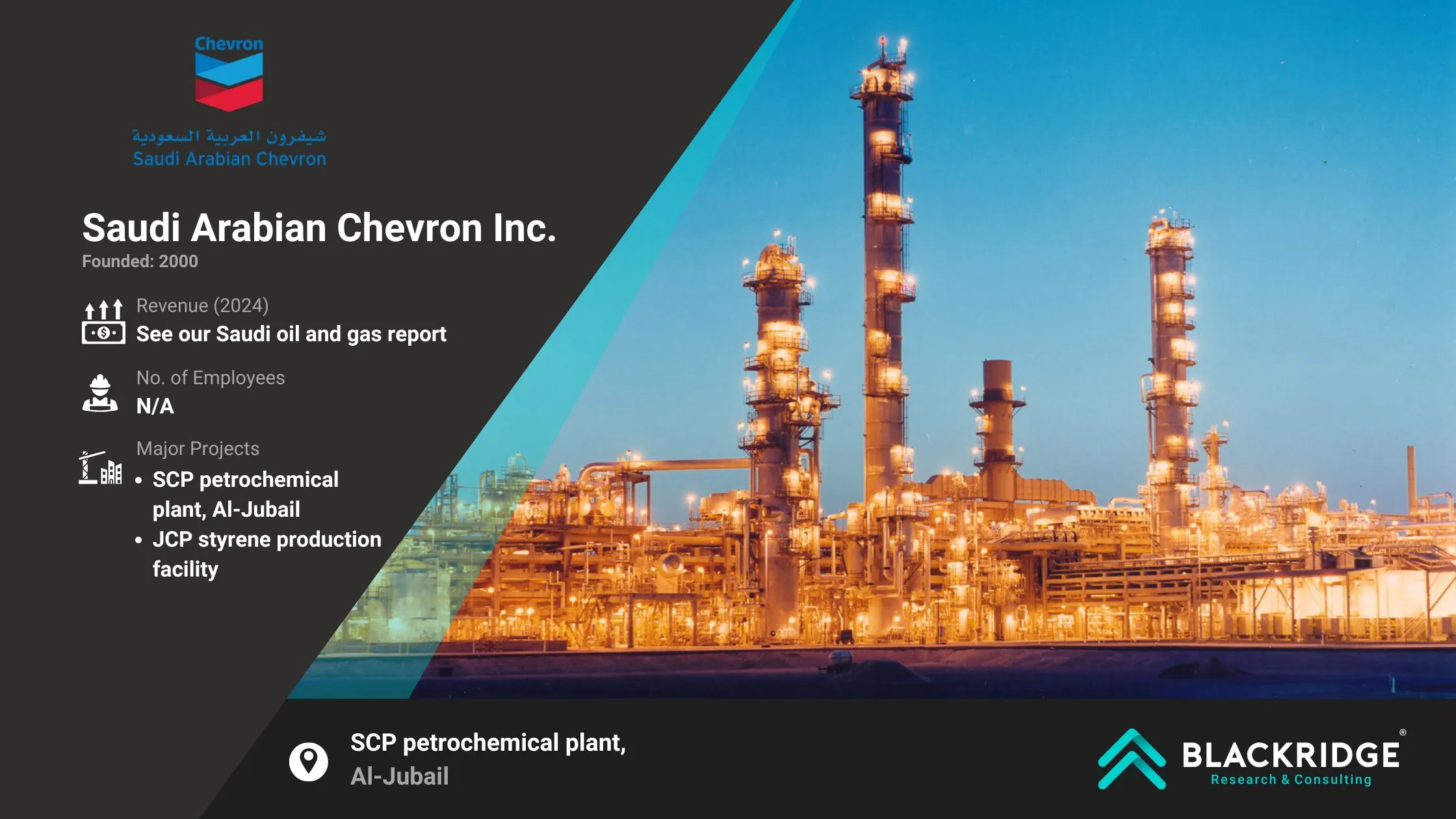
Saudi Arabian Chevron (SAC) is one of the largest oil and gas foreign companies based in Saudi Arabia. As the name indicates, the company is a subsidiary of the international oil company, Chevron Corporation. SAC operates in the PZ (Partitioned Neutral Zone) between Saudi Arabia and Kuwait, sharing hydrocarbon resources on a 50/50 basis.
The partnership is in the petroleum resources of the 5,000 square-kilometer onshore area of the Partitioned Neutral Zone (PNZ) between the Kingdom and the State of Kuwait. The agreement aims to produce 280,000,000 cubic meters of natural gas and 84,000 barrels of LNG per day. The agreement was extended and amended in 2009 and expires in 2039.
In December 2022, Saudi Aramco and Kuwait Gulf Oil Company signed a Memorandum of Understanding (MoU) to jointly develop the Durra gas field located in PNZ.
Currently, SAC holds the concession for Saudi Arabia's share, and the Kuwait Gulf Oil Company (KGOC) holds Kuwait's concession. SAC and KGOC jointly manage operations in Wafra through Joint Operations.
The joint venture also operates in three fields: Wafra, South Umm Gudair, and South Fuwaris. A fourth field, Humma, is under long-term evaluation for potential development. The Company also independently operates a storage and marine export facility at Mina Saud (Al-Zour).
Saudi Aramco Base Oil Company – Luberef
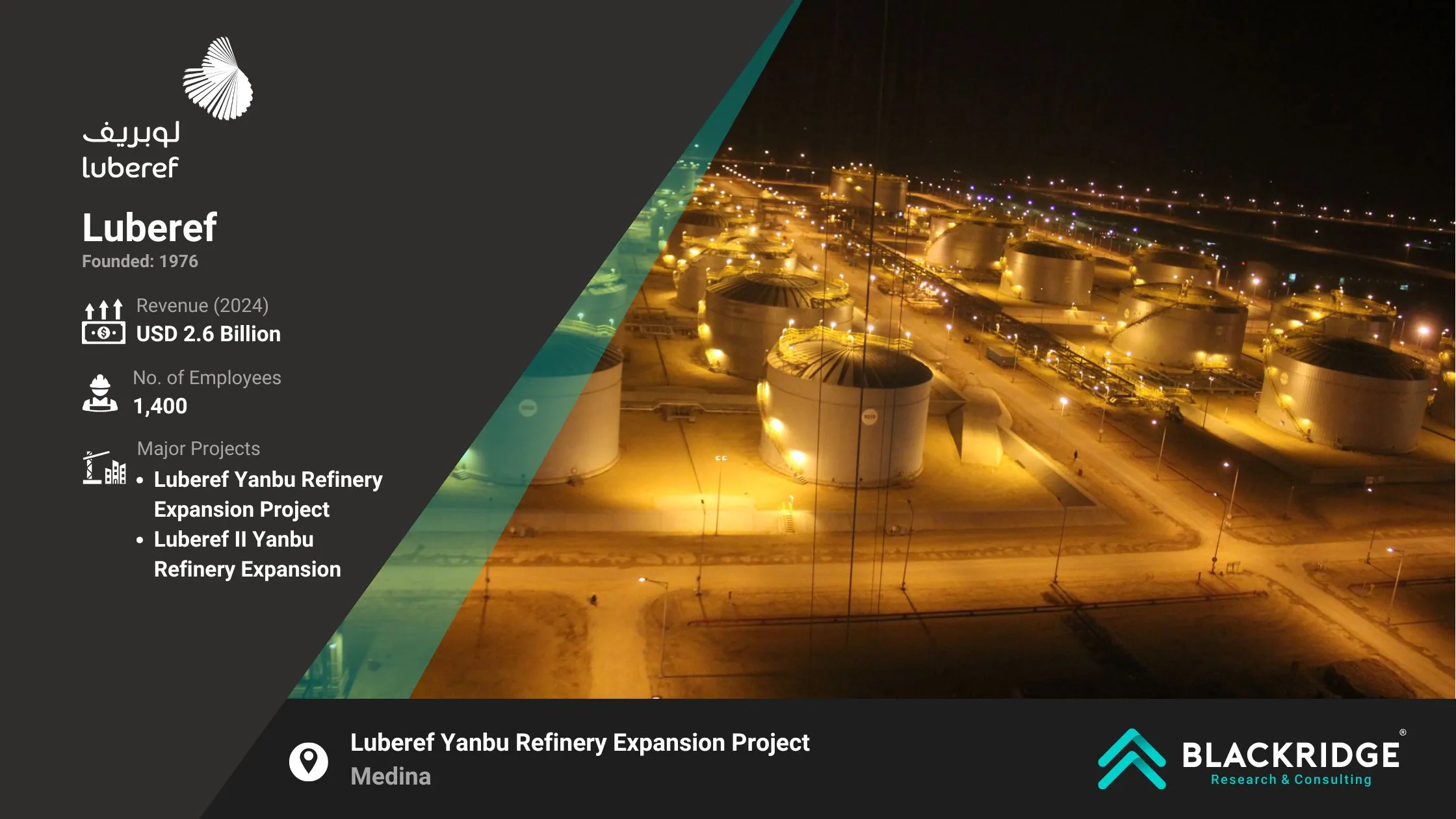
Saudi Aramco Base Oil Company, commonly known as Luberef, is a leading global producer of high-quality base oils. The Luberef was Established in 1976 as a joint venture between Petromin and Mobil. In 1996, Saudi Aramco acquired Petromin's shares and Jadwa Industrial Investment Company, obtaining Mobil's stake in 2007.
Luberef’s combined production capacity has reached approximately 1.4 million metric tonnes per annum with two strategically located facilities in Jeddah and Yanbu on the maritime Silk Road. This capacity is primarily focused on Group I and II base oils, which are critical components in producing lubricants for automotive, industrial, and manufacturing applications worldwide.
Luberef’s product portfolio includes three distinct categories of base oils: aramcoDURA (Group I), aramcoPRIMA (Group II), and aramcoULTRA (Group III). Luberef exports extensively throughout the Middle East, Pakistan, East Africa, India, Singapore, and Europe through its membership in the Aramco Base Oil Alliance.
The Saudi exchange (Tadawul) listed company is exploring future projects to produce group III and III+ base oils within Saudi Arabia to meet global demand. The oil company will be the first producer of base oils in the region after the implementation of the Yanbu facility expansion (Growth II), and it will increase production capacity by 1.6 million metric tonnes annually.
Saudi Aramco Total Refining and Petrochemical Company (SATORP)
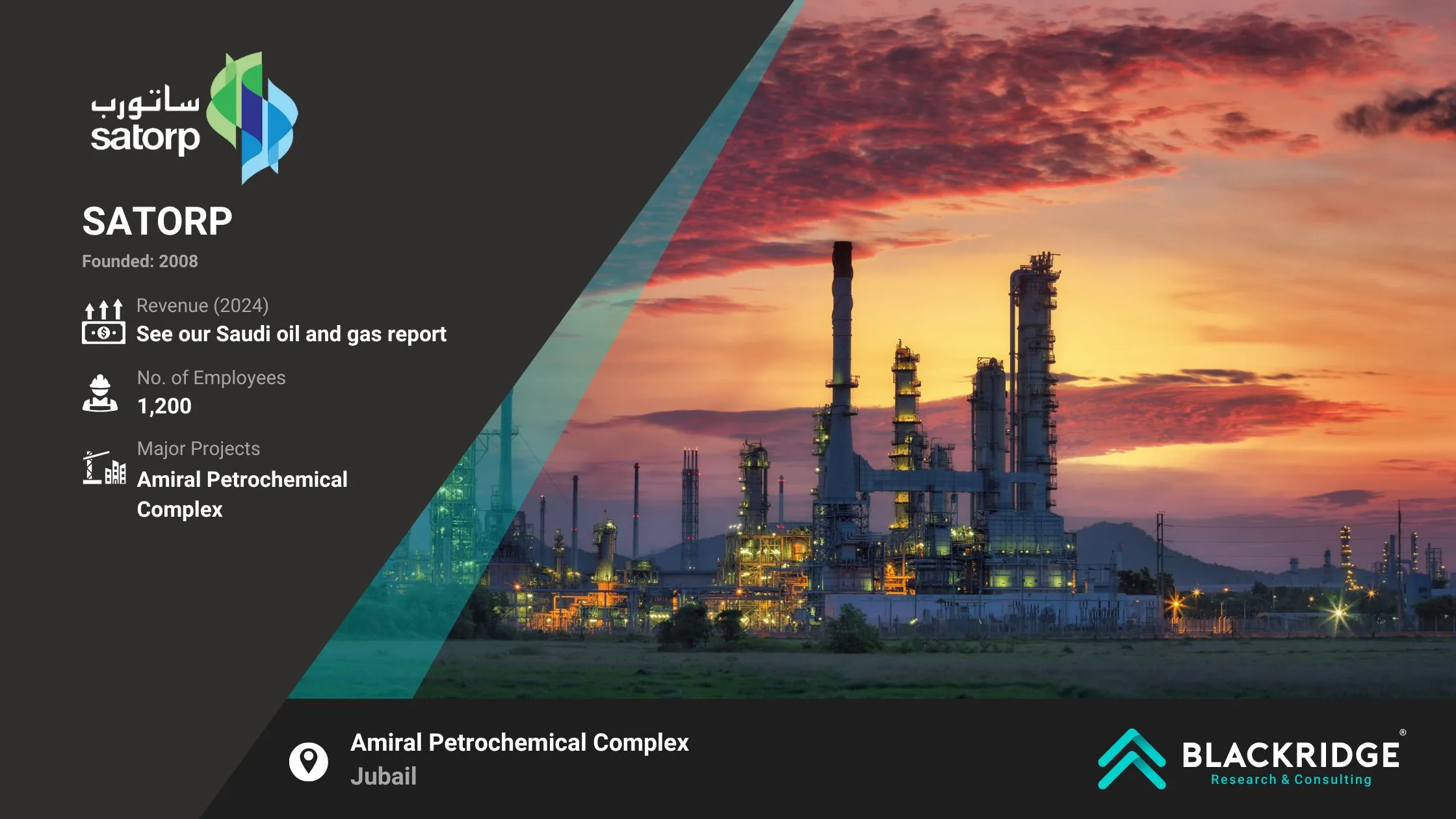
Saudi Aramco Total Refining and Petrochemical Company (SATORP) is a joint venture between industry giants Saudi Aramco (62.5%) and TotalEnergies. The company was established in 2008 and operates a world-class refining and petrochemical platform situated in Jubail Industrial City, Eastern Province, Saudi Arabia.
SATORP processes 460,000 barrels per day of Arabian Heavy Crude, transforming it into high-value refined and petrochemical products. The SATORP commenced commercial operations in June 2014.
SATORP’s complex is undergoing further expansion with the development of the Amiral project. The petrochemical complex of USD 11 billion is designed to integrate seamlessly with the existing refinery. The operation of the petrochemical plant is scheduled to begin operations in 2027.
Saudi Aramco Jubail Refinery Company (SASREF)
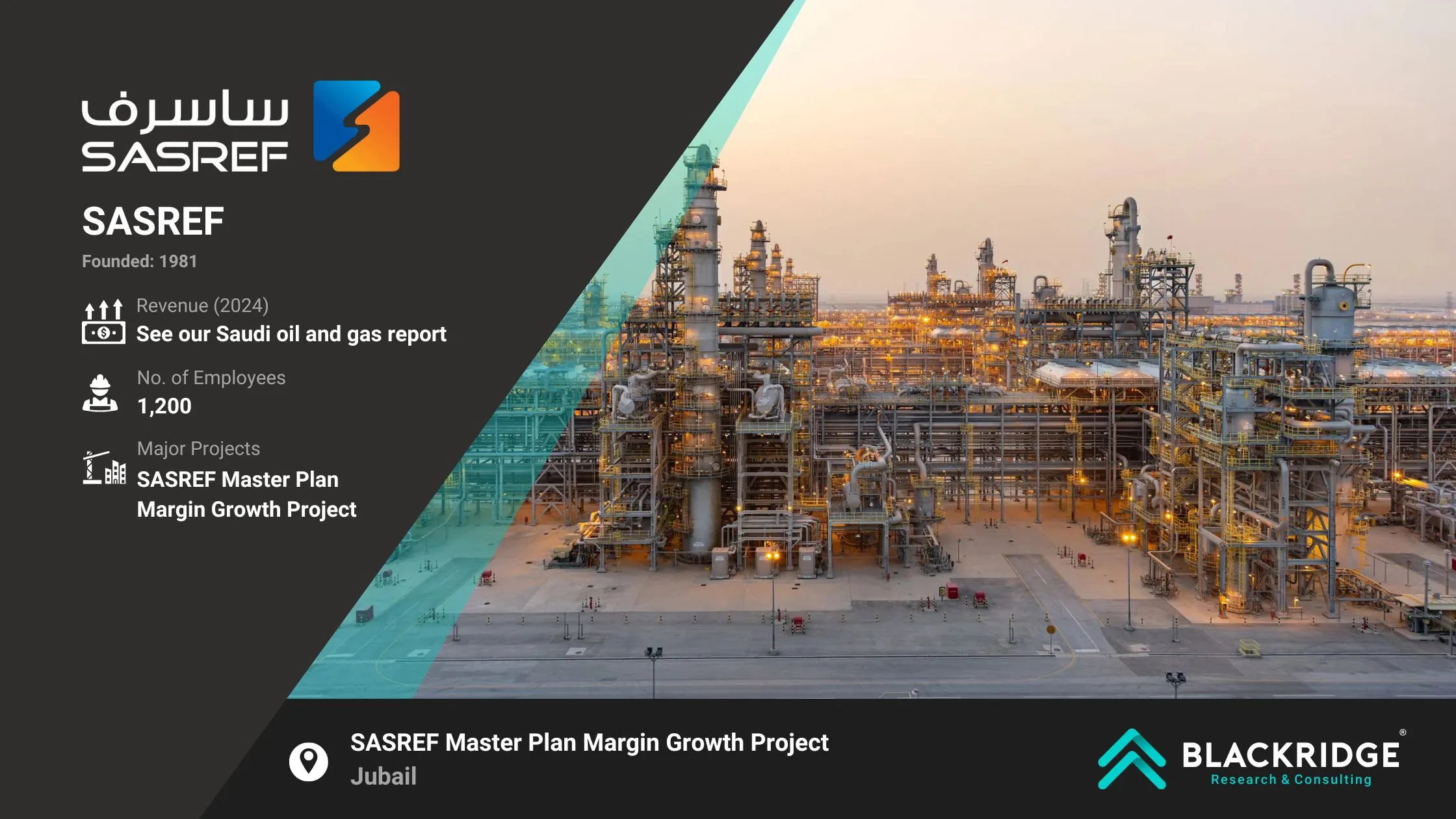
Saudi Aramco Jubail Refinery Company (SASREF) is one of Saudi Arabia's premier refining companies, and it is fully owned by Saudi Aramco. The company, established in 1981, is located in Jubail Industrial City. SASREF is known for its advanced technology and high processing capacity, reaching over 305,000 barrels per day.
The refinery converts crude oil into essential petroleum products, including diesel, gasoline, kerosene, naphtha, sulfur, and liquefied petroleum gas (LPG). SASREF’s advanced refining capabilities, featuring hydrocracker and thermal cracking units, enable it to produce high-quality, profitable white products through full crude oil conversion. In 2019, Saudi Aramco acquired Shell plc’s 50% stake for USD 631 million.
Saudi Aramco Mobil Refinery Company (SAMREF)
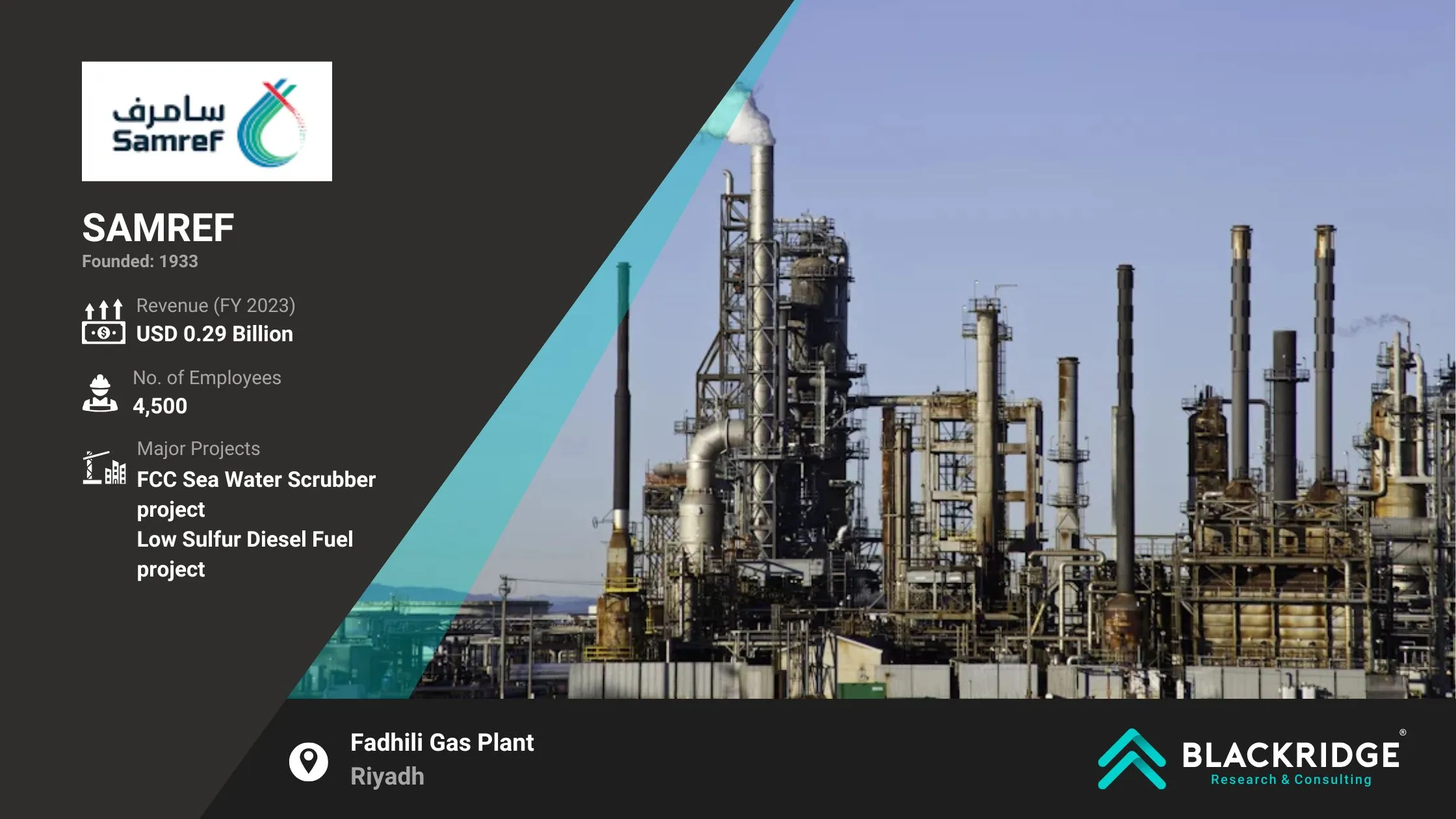
Saudi Aramco Mobil Refinery Company (SAMREF) is one of the biggest oil and gas refining companies located in Yanbu Industrial City, Saudi Arabia. The company has a capacity to process over 400,000 barrels of Arabian Light crude oil per day. SAMREF is an equally owned joint venture between Saudi Aramco and Mobil Yanbu Refining Company Inc., a subsidiary of Exxon Mobil Corporation.
SAMREF produces a wide array of high-quality petroleum products, including propane, various automotive diesel oil (ADO) grades, two grades of marine heavy fuel oil (MHFO), and sulfur. SAMREF has increased LPG production by implementing Split Olefin Feed Technology in its HF Alkylation Unit.
To further reduce environmental impact, SAMREF introduced an FCC Sea Water Scrubber to reduce SOx emissions from FCC flue gasses, converting them into sulfates that are safely discharged.
Yanbu Aramco Sinopec Refining Company (YASREF)
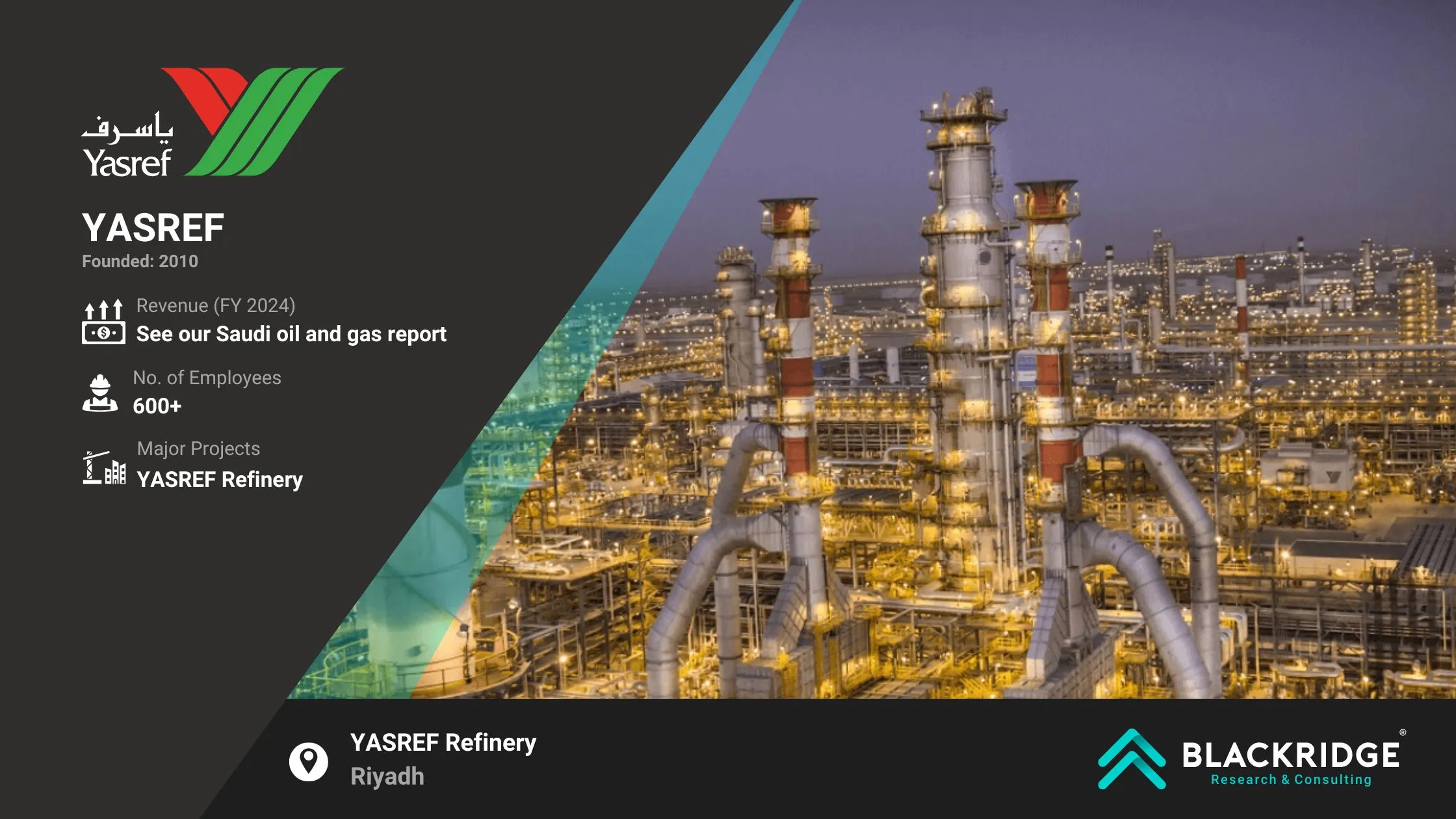
Yanbu Aramco Sinopec Refining Company (YASREF) is a joint venture between Saudi Aramco (holding a 62.5% share) and China Petroleum & Chemical Corporation (Sinopec) (holding a 37.5% share). The company operates a state-of-the-art, full-conversion refinery located in Yanbu Industrial City, Saudi Arabia.
YASREF was established on January 14, 2012, and processes up to 400,000 barrels per day (bpd) of Arabian heavy crude oil, which it converts into premium transportation fuels and high-value refined products.
YASREF’s product lineup includes 287,000 bpd of ultra-low sulfur diesel, 105,000 bpd of gasoline, 6,200 metric tons per day (MTD) of petroleum coke, 1,200 MTD of pelletized sulfur, 3,000 bpd of benzene, 6,000 bpd of propane, and 16 bpd of butane.
In recognition of its impact and successful project execution, YASREF won the ‘Construction Project of the Year’ at the Platts Global Energy Awards in New York City in December 2015. YASREF signed a Memorandum of Understanding (MOU) with ASMO in October 2024, aimed at exploring supply chain solutions that could enhance YASREF's business value.
Medra Arabia
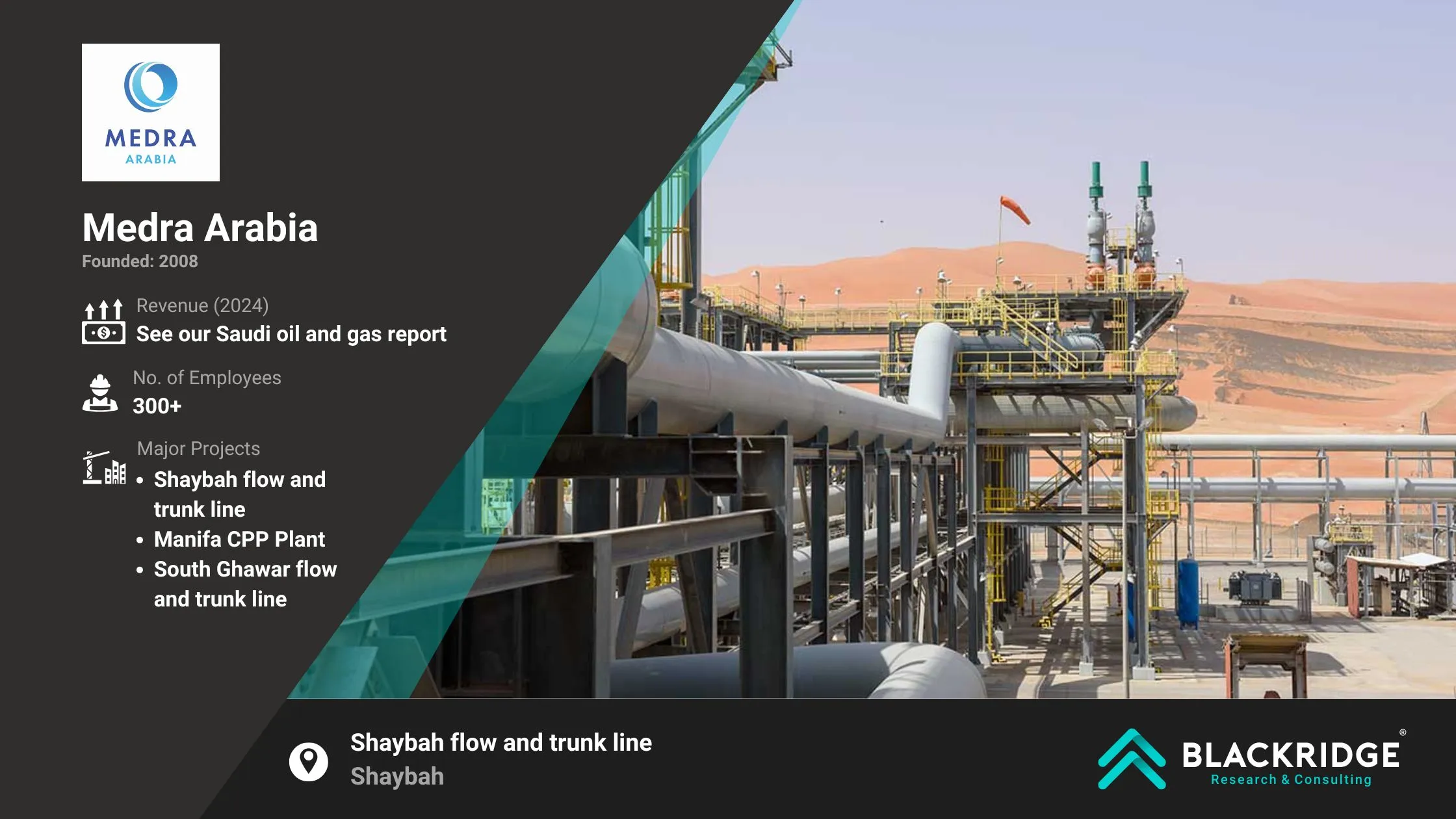
Medra Arabia is a diversified oil and gas service company headquartered in Dammam, Saudi Arabia. Medra Arabia was founded in 2004 and established as a leading service provider for the oil and gas industry in the Middle East. The company mainly focuses on both upstream and downstream operations.
Medra Arabia also offers a wide range of services to the oil and gas industry, including pipeline integrity management, well services, waste management, and membrane nitrogen generation for plants and refineries.
Saudi Arabia Oil and Gas Market (2025 Insights)
The Saudi oil and gas market remains underpinned by strong fundamentals, with production currently influenced by the ongoing OPEC+ production cut deal. The eight participating countries of OPEC have agreed to extend the cuts of 2.2 million b/d until the end of November 2024.
These cuts after November will gradually increase from December 2024 through December 2025 influencing the global market. Despite near-term constraints, Saudi Arabia's long-term oil production outlook remains bullish. The country has also revised its oil production capacity growth target downward from 13 million barrels per day (bpd) to 12 million bpd.
This adjustment is expected to save USD 40 billion over five years, with increased spending anticipated on natural gas, petrochemicals, and low-carbon ventures as part of the Kingdom’s diversification focus.
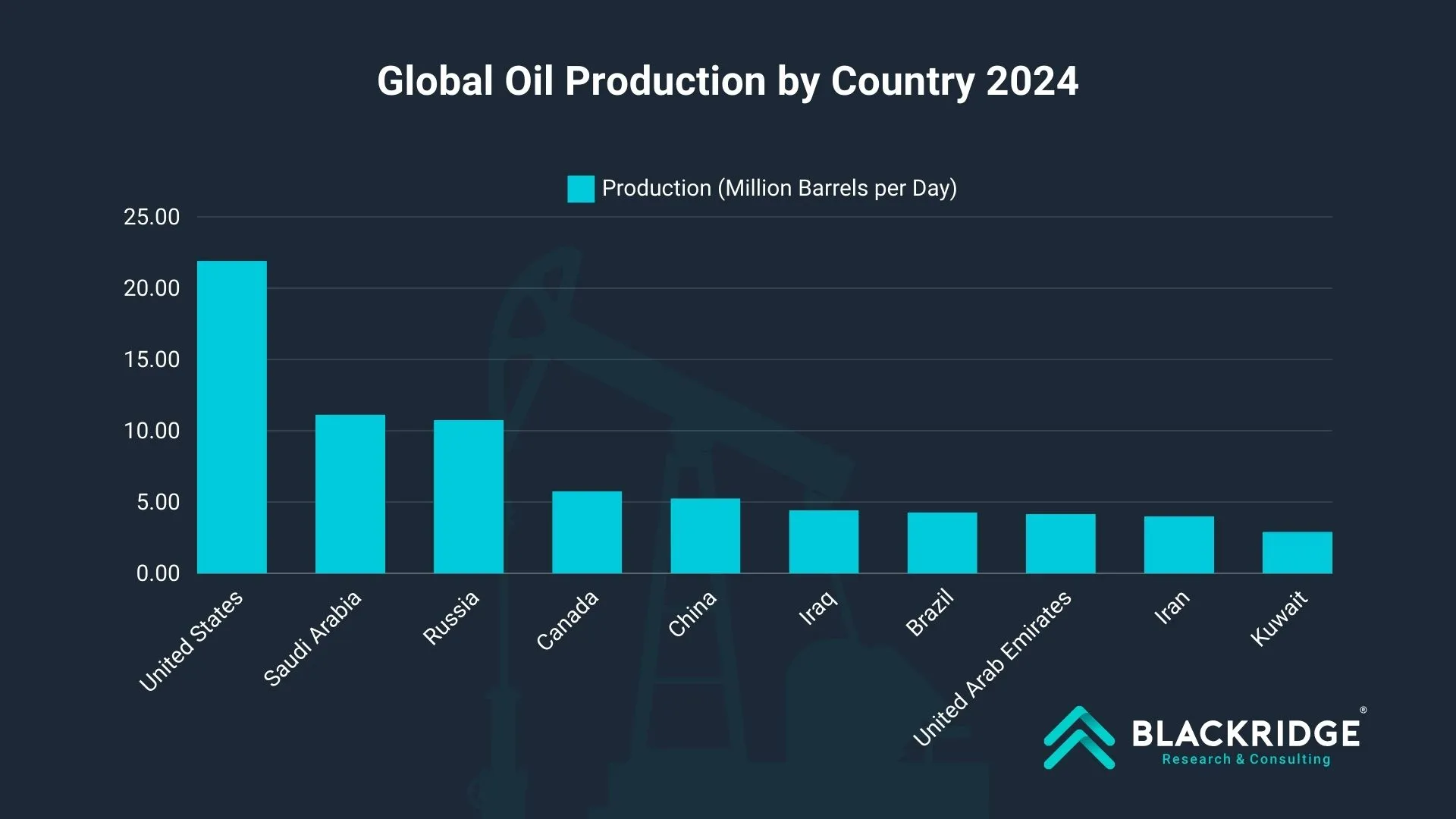
Saudi Arabia, which holds 268 billion barrels of oil reserves and 9.5 trillion cubic feet of gas reserves, is positioned as a global leader in oil production, accounting for a significant share of Middle Eastern and North African (MENA) output. The MENA region itself contributes 33% of the world’s oil and 16% of global gas production, with Saudi Arabia leading the way due to its large reserves and cost-efficient production methods.
Looking to the mid-2020s, Saudi Arabia’s Vision 2030 economic program and investments in large-scale infrastructure projects continue to support oil and gas demand. Economic growth, particularly from emerging Asian markets, and rising mobility needs are expected to drive demand for transportation fuels and petrochemical feedstocks.
According to Blackridge’s Saudi Arabia Oil and Gas Market Report, regional Saudi market oil demand is forecast to rise by 382,000 bpd year-over-year, reaching 9.27 million bpd by 2025. This is supported by strong economic momentum and infrastructure development. Over the next decade, Saudi Arabia’s oil and gas production is projected to grow at a steady rate of 1.5% CAGR, reinforcing its position as one of the most competitive and strategic nations in oil and gas.
In April 2025, Aramco announced the discovery of 14 oil and gas fields and reservoirs in Saudi Arabia’s Eastern Region and the Empty Quarter. The finds include 8,126 barrels per day of crude oil production and over 82 million scfd of natural gas, including associated gas. These are small-volume discoveries but add to the kingdom’s energy resources.
Conclusion
Top oil and gas companies in Saudi Arabia are a major contributor to national and global energy sector. The largest oil and gas companies in KSA showcase a blend of Saudi government led Saudi Aramco and international partnerships. These companies contribute immensely to the Saudi economy, support employment, and drive technological advancements across the oil and gas value chain. As Saudi Arabia continues to pursue Vision 2030, these top companies will be instrumental in enhancing energy security and meeting regional and global energy market demands.
Be the First to Know Exclusive Details About Upcoming Crude Oil Refinery Plant Projects in Saudi Arabia!
Subscribe to our Crude Oil Refinery Plant Database and unlock:
Comprehensive project details on planned, upcoming, ongoing, and commissioned construction projects
Timely updates on tenders and new developments
Access to key stakeholders and decision-makers
Market insights and future trend analysis by experts
Stay ahead with timely updates and developments in crude oil refinery plant projects in Saudi Arabia by subscribing to Blackridge’s Saudi Crude Oil Refinery Plant Database!
Why Blackridge’s Global Projects Tracker?
Blackridge’s Global Projects Tracker covers projects from 150 countries and is updated with real-time, accurate, and authentic project developments. By subscribing to our Global construction project database, you can get access to key contact details of ongoing and upcoming projects, project timelines and overviews, and regular alerts on project developments, all served to you through an easy-to-use interface.

Leave a Comment
We love hearing from our readers and value your feedback. If you have any questions or comments about our content, feel free to leave a comment below.
We read every comment and do our best to respond to them all.